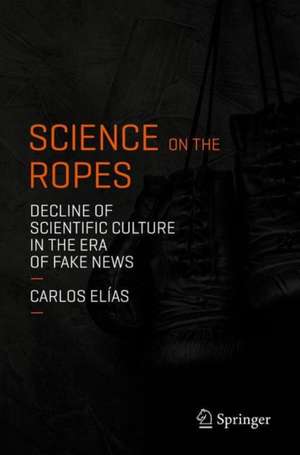Science on the Ropes: Decline of Scientific Culture in the Era of Fake News
Autor Carlos Elíasen Limba Engleză Paperback – 23 mai 2019
In this controversial essay, Carlos Elías addresses the worldwide phenomenon that is threatening the scientific and economic progress of Western countries. The rise and influence of magic and irrationality in the media, in social networks and at universities is a disturbing phenomenon: many Western students no longer want to pursue STEM (Science, Technologies, Engineering, and Math) careers.
This lucid and well-written book addresses one of the key issues of public debate: the deteriorating state of science in Western countries and their governments, and its rise in Asian countries. The author compares two distinct models: the Spanish or Latin model, which closed the door on science with the Counter-Reformation, and that employed by a second group of countries where science was encouraged. Elías suggests that a similar development could now be taking place between Western countries (where the press, television and social science academics are becoming increasingly critical towards science) and Asia, where most prime ministers (and other politicians) are scientists or engineers.
This book is intended for STEM educators (both at secondary schools and universities), scientists and academics interested in scientific culture in the era of fake news.
Preț: 164.13 lei
Nou
Puncte Express: 246
Preț estimativ în valută:
31.42€ • 34.14$ • 26.41£
31.42€ • 34.14$ • 26.41£
Carte disponibilă
Livrare economică 31 martie-14 aprilie
Preluare comenzi: 021 569.72.76
Specificații
ISBN-13: 9783030129774
ISBN-10: 3030129772
Pagini: 290
Ilustrații: X, 330 p. 7 illus., 4 illus. in color.
Dimensiuni: 155 x 235 x 18 mm
Greutate: 0.48 kg
Ediția:1st ed. 2019
Editura: Springer International Publishing
Colecția Copernicus
Locul publicării:Cham, Switzerland
ISBN-10: 3030129772
Pagini: 290
Ilustrații: X, 330 p. 7 illus., 4 illus. in color.
Dimensiuni: 155 x 235 x 18 mm
Greutate: 0.48 kg
Ediția:1st ed. 2019
Editura: Springer International Publishing
Colecția Copernicus
Locul publicării:Cham, Switzerland
Cuprins
- Introduction
- Preparing the trip
- Why is there a decline in science?
- An economic system that strangles science
- Films and television in the collapse of the science culture
- Postmodern philosophy, university and academic power in favor of irrationality
- Literary (and mythological) hegemony vs. scientific decadence
- Science in the art
- Journalistic (and media) culture and the collapse of science popularization
- Impact Journals and Science
- Scientific language locked in the closet
- Where does it take us to strangle reason and science?
- Epilogue
- Why is there a decline in science?
- An economic system that strangles science
- Films and television in the collapse of the science culture
- Postmodern philosophy, university and academic power in favor of irrationality
- Literary (and mythological) hegemony vs. scientific decadence
- Science in the art
- Journalistic (and media) culture and the collapse of science popularization
- Impact Journals and Science
- Scientific language locked in the closet
- Where does it take us to strangle reason and science?
- Epilogue
Recenzii
“This is a great virtue of Science on the Ropes, which tackles the impending destruction of Western culture with strong and explicit arguments from an integrative perspective typical of an Enlightenment scientist. It does so with courage and without concessions. Furthermore, it maintains the ultimate goal of stimulating both a rigorous debate in the academic community and the progress of scientific and technological knowledge that, ultimately, defines us as a society and constitutes the foundation of Western civilization.” (Francisco Lopez‑Cantos, Metascience, Vol. 30 (1), February 6, 2021)
Notă biografică
The author is a former scientist and journalist and now is full professor of Journalism, Science and Society at the Carlos III University of Madrid and UNED (The Spanish Open University). His research focuses on the relationship between policy-making, science, technology and mass media culture. He has been a visiting scholar at the London School of Economics and at Harvard University. He is one of the European academics most interested in uniting the two cultures of Snow - science and humanities - as a way to improve the economic, social and cultural future of Europe.
Textul de pe ultima copertă
In this controversial essay, Carlos Elías addresses the worldwide phenomenon that is threatening the scientific and economic progress of Western countries. The rise and influence of magic and irrationality in the media, in social networks and at universities is a disturbing phenomenon: many Western students no longer want to pursue STEM (Science, Technologies, Engineering, and Math) careers.
This lucid and well-written book addresses one of the key issues of public debate: the deteriorating state of science in Western countries and their governments, and its rise in Asian countries. The author compares two distinct models: the Spanish or Latin model, which closed the door on science with the Counter-Reformation, and that employed by a second group of countries where science was encouraged. Elías suggests that a similar development could now be taking place between Western countries (where the press, television and social science academics are becoming increasingly critical towards science) and Asia, where most prime ministers (and other politicians) are scientists or engineers.
This book is intended for STEM educators (both at secondary schools and universities), scientists and academics interested in scientific culture in the era of fake news.
Caracteristici
Analyzes the decline of science and scientific culture in today's Western societies and compares it with the increase in Asian countries
Offers a critical perspective about the complex process of science production in a system dominated by the mass media culture
Updates the concept of "two cultures -science vs. literacy and social science-" and the conflict between them in the 21st century
Offers a critical perspective about the complex process of science production in a system dominated by the mass media culture
Updates the concept of "two cultures -science vs. literacy and social science-" and the conflict between them in the 21st century
